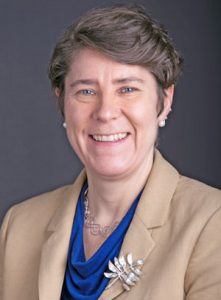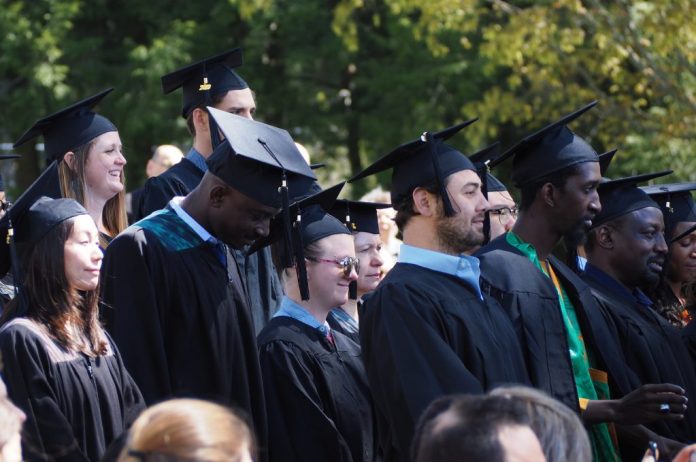Dr Sophia Howlett of the School for International Training, Vermont, in conversation with Ron Ragsdale
Your university education was in the UK and focussed on English Literature. How did you get involved in Education Management, particularly in an international context?
It’s surprising how many English Lit graduates you find in higher education management! I like to think it’s because we are great at analysing a situation (everything is a text to be “read”) and providing a structured critique. We also tend to be good at understanding the motives and thinking of those around us. Both strengths are vital in managing a campus.
But I got involved in management when I realised that I was not comfortable with remaining in my classroom or in the library when our department or faculty, or even university, was not being managed well. If I could see a problem, I wanted to solve it.
I spent the first 15 years of my career trying to balance my love of scholarship with my desire to improve my working environment – trying to decide which one I really wanted to do. In the end, I realised I was only going to be happy doing both. So, now I spend my time off from management activities doing research in my field. I have a book coming out this year, in fact.
The international element came later. I was looking for a sabbatical opportunity. I had been made a permanent faculty member in the UK very early in my career (I was 27) and so decided to take a year out and do some giving back before looking for the next opportunity to move my academic career forward.
I found an organisation called Civic Education Project, set up by Yale and Oxford with funding from George Soros, which was sending professors to post-communist countries to help universities and students through a very complicated transition process. For example, imagine being in a Russian university teaching economics, which necessarily was primarily Marxist-Leninist economics, and suddenly every single class you’ve been teaching, every single book in the library, is either irrelevant or belongs to a History of Economic Thought program!
I signed up and was sent to Ukraine. There was so much interest from Ukrainian colleagues and students to engage globally, and for new approaches to learning (introducing student-centred learning, for example) that at the end of my year I was just not ready to go home.
I resigned my permanency and took over Civic Education Project Ukraine, spent an amazing second year there and then was in Russia. Whilst in Russia, I saw the opportunity to have an even bigger impact across the entire post-communist region through work with Central European University, which was then an entirely new university set up by George Soros in Budapest, Hungary.
You are relatively new to working for an institution that plays a significant role within the ELT industry. What has surprised you, in terms of ELT training compared to other educational disciplines?
First, I think the way ELT encompasses such a wide audience, with very different interests and needs that somehow come together around a passion for teaching English Language. ELT trainees can be teachers in US schools; they can work for refugee centres in the US; they can work all over the world through the federal government, with individual national governments, for universities or just as independent lovers of international education.
Second, I am fascinated by the movement from bilingual education to plurilingualism. I’ve seen this as a conversation in the European Union. SIT is at the forefront of this conversation in the United States and I’m so excited to see how it will play out here.
Why would you encourage English language teachers looking to study for a master’s degree to consider SIT?
We are the history of the field and we are the future of our field. Our history brings us an alumni network and a depth of experience second to none, and our commitment to the future – particularly focusing on plurilingualism – makes us the most exciting institution to study with now.
Finally, let’s talk about the present day. The SIT approach fosters each of our students holistically. It takes them from where they are when they join us to where they want to be – rather than trying to mechanise the learning process by providing a one-size-fits-all educational approach. We are incredibly proud of our attention and commitment to each student’s personal learning trajectory.
How easy is it for non-native speakers to succeed in the US graduate school environment?
We have always placed language studies together with culture because inevitably this is a two-fold problem. Yes, of course you need a certain level of English to succeed, though this can also depend on the nature of the subject.
SIT Graduate Institute specialises in more applied disciplines, which are inevitably more supportive for non-native speakers. But the US educational experience – the higher education culture – is also very important. For instance, US students have a breadth of study from the four-year degree, whereas a student from another country may have a real depth of study from their BA.
Many graduate degrees also lack a global dimension – there are few or no places for a non-native speaker to interject different knowledge or understandings. SIT Graduate Institute is intentionally global in substance and nature and welcomes diversity of input and experience. And if it’s not there, we welcome students getting involved to ensure it is a genuinely global cultural learning experience.
How important is research on what happens in the classroom, in terms of how teachers are trained at SIT?
Research is an important source of new ideas, but it is one source only. Cultivating an attitude of inquiry and reflection is critical to ongoing personal and professional development. It is important also to tap into people’s lived experiences. It is critical to consider both emic and etic perspectives.
What is the most important message you would give to teachers working with English language learners?
Be advocates. Be patient. Learning another language takes time. Don’t do for learners what they can do for themselves – in the words of Gattegno. At the same time, it is important to be in a position to offer cognitive shortcuts and approaches to the learning task in a brain-friendly manner.
How important do you think neuroscience will be in further language acquisition research?
Learning about how the brain functions can be helpful, but learning another language is far from a purely cognitive process. Complexity and Dynamic Systems Theory offers a much richer research agenda. For quite a few years now, researchers have been pushing for a social and multilingual approach in second language acquisition.
What is your message to practicing teachers thinking of furthering their professional development with a master’s degree?
A master’s degree is important for teachers who want to improve and deepen their practice, serve their students more effectively and avoid their own burnout. It is a wonderfully stimulating intellectual experience.
SIT’s response to the global Covid-19 pandemic
“School for International Training has faced perhaps the greatest challenge in its nearly 90-year history as a result of the pandemic. In March, with graduate and undergraduate programs across all seven continents, we found ourselves racing to repatriate 920 students as countries began sealing their borders and grounding commercial flights — sometimes with less than 24 hours’ notice — stranding hundreds of our students abroad.
“SIT and World Learning faculty stepped up in an unprecedented show of support for this effort, working far outside their job descriptions and around the clock to make sure our students were safe, housed and fed in- country, and booked on outbound flights as soon as they became available.
“Since bringing our students safely home, we have turned our full attention to the new set of challenges at hand, transitioning students from immersive, field-based experiences to an online learning platform.
“SIT is pursuing creative ways to maintain our signature programming at this very challenging moment. Our SIT Graduate Institute semester began on 1 June, but because we are unable to offer our usual face-to-face seminars for low-residency students on the Vermont campus, summer courses are fully online and extended for two weeks, to end on 28 August. Decisions are still pending about fall starts for our global master’s degree programs, which take place in SIT centers around the world.
“Finally, we have enhanced two of our graduate-level scholarship opportunities for Peace Corps volunteers forced to repatriate this year due to the coronavirus. These scholarships reflect SIT’s foundational partnership with the Peace Corps dating back to 1964.”
Kate Casa, Director of Communications, SIT

Dr Sophia Howlett is President of the School for International Training in Brattleboro, Vermont, USA. She holds a PhD in European Renaissance Philosophy and Literature from York University, UK, and a BA in English Literature from Cambridge University. She has extensive international experience in more than 40 countries.





